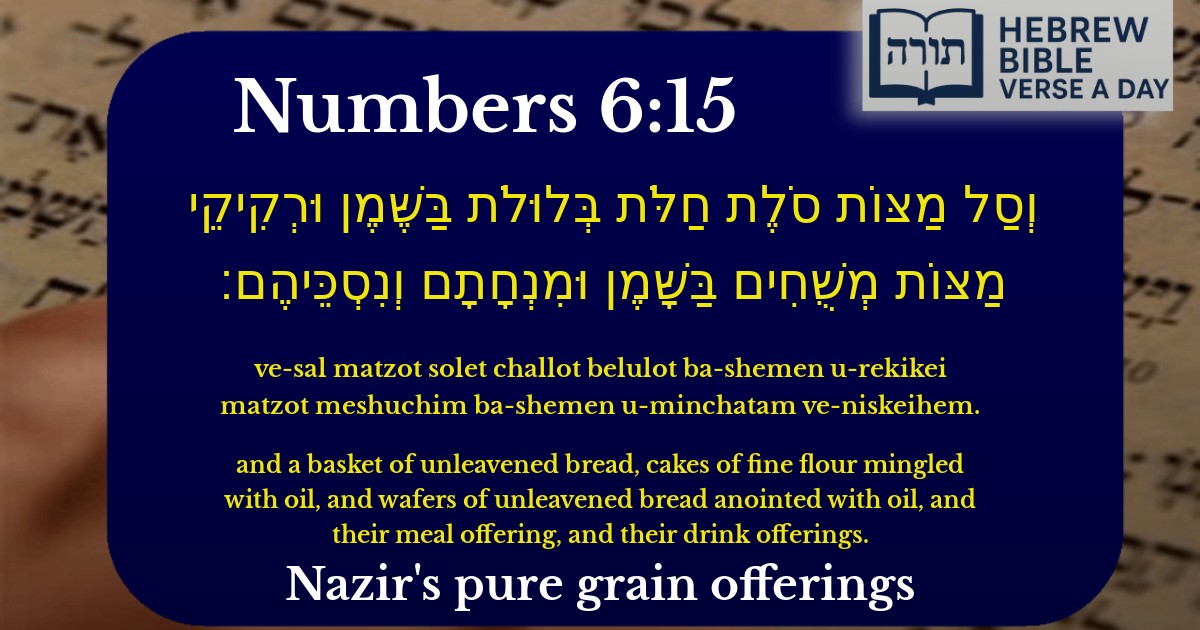Frequently Asked Questions
Q: What is the significance of the unleavened bread (matzah) mentioned in Numbers 6:15?
A: In Numbers 6:15, the unleavened bread (matzah) is part of the offerings brought by a Nazirite at the completion of their vow. Matzah symbolizes humility and simplicity, as it is made without leaven (which represents arrogance or sin). The Torah often associates matzah with purity and dedication, which aligns with the Nazirite's commitment to holiness (Rashi on Numbers 6:15).
Q: Why are the bread offerings mixed with oil in this verse?
A: The oil mixed with the bread offerings (such as the 'cakes of fine flour mingled with oil') represents richness and joy in serving Hashem. Oil is often a symbol of wisdom and divine favor in Jewish tradition (Talmud, Menachot 86a). For the Nazirite, it signifies that their dedication to holiness is pleasing and elevated before G-d.
Q: What is the purpose of the meal offering and drink offerings in Numbers 6:15?
A: The meal offering (mincha) and drink offerings (nesachim) accompany the Nazirite's sacrifices as part of their complete devotion to Hashem. These offerings express gratitude and submission, showing that the Nazirite’s service is wholehearted (Rambam, Hilchot Maaseh HaKorbanot 2:1).
Q: How does the Nazirite's offering in this verse relate to Jewish practice today?
A: While the Temple offerings are not currently brought, the principles behind the Nazirite’s offerings—dedication, humility, and gratitude—remain central to Jewish life. Many Jews today emulate the Nazirite’s commitment by taking on extra spiritual disciplines, such as fasting or additional Torah study (Talmud, Ta’anit 11a).
Q: Why does the Torah specify different types of unleavened bread in this verse?
A: The verse mentions both 'cakes of fine flour mingled with oil' and 'wafers anointed with oil' to teach that there are multiple ways to express devotion. Some offerings are richer (mixed with oil), while others are simpler (wafers), showing that holiness can be achieved in different forms (Midrash Tanchuma, Naso 10).


Context in the Torah
The verse (Shemot 29:2) describes the components of the mincha (meal offering) brought during the consecration of the Kohanim (priests) for the Mishkan (Tabernacle). The offerings consist of matzah (unleavened bread) in different forms—cakes, wafers, and a basket—all prepared with fine flour and oil.
Rashi's Explanation
Rashi (Rabbi Shlomo Yitzchaki) explains that the "סַל מַצּוֹת" (basket of unleavened bread) refers to three types of matzah offerings:
Rashi emphasizes that all these were matzot, not chametz, because leaven symbolizes sin and corruption, whereas matzah represents humility and purity, fitting for the sanctification of the Kohanim.
Rambam's Perspective
In Hilchot Ma'aseh HaKorbanot (Laws of Sacrificial Procedure), the Rambam (Maimonides) elaborates that these offerings were part of the korban milu'im (inauguration offering) for Aharon and his sons. The meticulous preparation—using only the finest flour and pure oil—reflects the importance of dedicating the highest quality to divine service.
Symbolism in Midrash
The Midrash (Vayikra Rabbah) connects these offerings to spiritual refinement:
The absence of leaven teaches that arrogance (se'or she'b'issa, the "leaven in the dough") has no place in sacred duties.
Halachic Insights from the Talmud
The Talmud (Menachot 75a) discusses the precise measurements and preparation methods for these offerings, emphasizing that:
This reflects the principle that every detail in avodah (service) must be performed with exactitude.